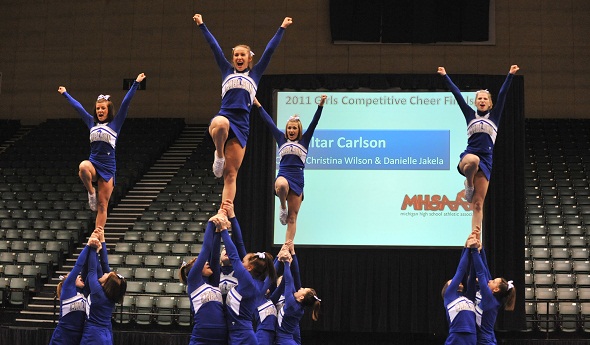
MHSA(Q&)A: Gibraltar Carlson cheer coach Christina Wilson
February 17, 2012
 After cheering through middle and high school, Gibraltar Carlson competitive cheer coach Christina Wilson started coaching the Marauders’ middle school team the season after she graduated from Carlson High in 2001. She took over the varsity team in 2007 – and has accomplished in a short time what many coaches hope for over decades.
After cheering through middle and high school, Gibraltar Carlson competitive cheer coach Christina Wilson started coaching the Marauders’ middle school team the season after she graduated from Carlson High in 2001. She took over the varsity team in 2007 – and has accomplished in a short time what many coaches hope for over decades.
Carlson has won three of the last four MHSAA Division 2 championships – also finishing runner-up in 2010 – and is ranked No. 1 in its division heading into District competition this weekend. The Marauders have had a strong program throughout the history of competitive cheer as an MHSAA sport – they won the Class B championship in 1995 under Pat Christiansen and finished runners-up three straight seasons after that – but are on a run unequaled over the last five seasons.
Bowling Green, Eastern Michigan and Oakland’s cheer teams now boast former Carlson athletes, and all of this success could be just the start – Wilson may have accomplished a lot early in her career, but she said she hopes to keep the Marauders rolling for years to come.
What kind of things did you learn from your high school coach that you still teach today?
As soon as I started coaching middle school – we also got a new coach at the varsity level as well, so we had new coaching throughout the program at that time – I took and got the resources from our former coach in ’95 (Pat Christiansen) and started using all her resources. Everything she implemented and used for her teams, I took and continue to use today
Her daughter (Tami) coached with her in ’95 when we won the state championship, and she recently came back in 2010 as one of our assistants. She brought back that mentality of ’95 of working hard … the harder the practices the more successful you’ll be … make practices count enough so on Saturdays you can be as prepared as you can be … and the importance of making of making good decisions, in practice and outside sports as well.
Your program had success previously. But what happened to take Gibraltar Carlson to the next level?
I started coaching middle school, and by the time I moved up to varsity all (my) rules and procedures, the kids were used to it and it was (the same) throughout the program. It was becoming a program-wide thing to become excellent. It wasn’t just team by team, and I think that helped. We hold our kids to really high standards, and we’re expected to reach our goals and expectations.
What is the one big thing your athletes take away after four years of being part of your program?
We have the mementos and the championship rings and those things. But I think it’s a sense of pride. It gives them a sense of self. They know they can have goals, and if they work hard they can achieve those goals. If they put their minds to something, it’s something they can grasp if they work hard. I think that whole mentality of working hard, pursuing goals and teamwork is instilled right from the get-go, and something they take with them when they leave the program.
How do you stay ahead of the competition?
It’s not easy. We go to several camps; there’s a champion cheerleading camp we go to every summer. We work with college teams too; they come and show us things they do and teach us things. We take some kids every once in a while to out-of-state clinics (Kentucky, Bowling Green, etc.). We really try a diversity of things to get the girls out there and experiencing things. The techniques and ideas, it’s all about seeing something and then adding that to imagination to come up with whatever knows what.
Why are your teams so consistent?
We hold them to high expectations. We have gymnastics classes that they regularly attend, and on their own they go to the gymnastics facility once or twice a week extra on top of that to stay on top of their skills stay among the best athletes in state. One thing we do every year is we create a huge goal board. What we do after we start competing, is every Monday we check off what we’ve completed on the goal board. It’s not just a mental aspect, but it’s visual. Every week focus on something we try to achieve.
What do you enjoy most about coaching?
I love working with the kids. They’re funny. Practice is something new every day; you never know what you’re going to get. It’s so much fun. (And) competing is fun. I like the aspect of competition, the intensity of it. That’s lots of fun too. Winning is fun.
This is the sport Gibraltar Carlson has become known for, the one in which it’s had the most success lately.
It’s starting to grow. People look at cheerleading like, “Oh, it’s cheerleading.” We are definitely gaining the respect of other coaches and other programs, other sports and teachers and the student body. The really cool thing is when people start to look at the sport and realize how physically demanding it is. It makes us feel good to hear when other coaches say they think maybe the cheerleaders might be some of the best athletes in this school.
 PHOTO from last season's MHSAA Division 2 Final at the Grand Rapids DeltaPlex.
PHOTO from last season's MHSAA Division 2 Final at the Grand Rapids DeltaPlex.

NFHS Voice: Thank You to All Coaches
January 29, 2021
By Karissa Niehoff
NFHS Executive Director
Earlier this week, the NFHS recognized more than 700 individuals for their efforts as high school coaches during the 2019-20 school year, including 23 as National Coaches of the Year.
The accomplishments of the national recipients are extraordinary, but comments about their roles as education-based coaches are even more telling as to why they were selected.
Mary Beth Bourgoin, field hockey coach at Winslow High School in Maine, who, although she has won 173 games, said, in an article in the Portland Press-Herald, “It’s not about winning and losing. It’s about relationships and having fun.”
Donna Moir has won three state championships as girls basketball coach at Sacred Heart Academy in Louisville, Kentucky, but is known more for her sportsmanship, humility and kindness.
Jerry Petitgoue, basketball coach at Cuba City (Wisconsin) High School, who has won 963 games in 53 years, led his team to an unblemished 25-0 record before the pandemic cancelled the state tournament.
In an article for SWNew4u.com, Petitgoue said, “I’m very proud to receive this recognition for Cuba City High School and the community. I’m happy it comes during these trying times. Every little positive thing is uplifting these days.”
Mary Jo Truesdale, softball coach at Sheldon High School in Sacramento, California, has won 759 games and eight California Interscholastic Federation-Sac Joaquin Section championships, but was unable to coach her team last spring due to the pandemic.
“I worry about the well-being of my players, especially the seniors who don’t have a next season to play in high school,” said Truesdale in an article in the Sacramento Bee. “We know there are more things going on in life that are much bigger than softball, and that’s what we’re all learning.”
Ron Murphy, baseball coach at Rio Rancho (New Mexico) High School, is second all-time in his state with 567 victories but was only able to lead his team to a few wins last spring before the coronavirus shut down the program and ended hopes for a state tournament.
Despite his own success, Murphy was more focused on his players in a recent article in the Albuquerque Journal, noting that, “The thing that gets me most excited about this award is that it brings national attention to Rio Rancho High School baseball.”
Doug Hislop, wrestling coach at Imbler (Oregon) High School, has coached for 50 years and remains active at 73 years of age, continuing to teach kids lessons on and off the mat.
David Halligan, soccer coach at Falmouth (Maine) High School, has led his teams to 12 state titles. In an article in the Portland Press Herald, Halligan said, “I’m proud that we’ve had a lot of good players and good programs for a lot of years. I find a lot of joy in coaching at the high school level. I love seeing how kids develop from freshmen to seniors and how they grow as people.”
These are but a few of the individuals selected for national honors in 2019-20 – all of whom have impacted student-athletes in positive ways for decades.
When it comes to honoring coaches for the 2020-21 school year, we should give a shout-out to every individual involved in high school education-based athletics for their tremendous efforts leading programs through the pandemic. Next to frontline health-care workers, there is no group of individuals to whom we should be more indebted than high school coaches.
Prior to the pandemic, a high school coach’s job was already a next-to-impossible 24-7 mission. In addition to preparing for the daily “Xs and Os,” interscholastic coaches spend countless hours in mentorship capacities with student-athletes off the field or court, answer tough questions from parents, teach classes during the school day and handle a number of never-ending, always-changing daily tasks.
This year, coaches are faced with other tasks related to COVID-19, which, in some cases, involve keeping team members connected and motivated in a virtual setting.
There is pressure on coaches to maintain protocols related to the pandemic and stay on course so the games can continue. The additional daily checklist is endless: sanitize equipment, remind students to wear masks and maintain social distancing, temperature and wellness checks with students, follow an endless list of protocols if a student tests positive, and the list goes on and on.
The tasks of high school coaches seem larger than life this year, and these men and women deserve our utmost respect and appreciation. In addition to parents, and perhaps in lieu of parents in some cases, high school coaches are helping student-athletes survive the pandemic and maintain a healthy outlook on life.
We salute this year’s award recipients – and all high school coaches – for their commitment to keeping our country’s future leaders – high school students – on track during one of the most trying years in our nation’s history.
Dr. Karissa L. Niehoff is starting her third year as executive director of the National Federation of State High School Associations (NFHS) in Indianapolis, Indiana. She is the first female to head the national leadership organization for high school athletics and performing arts activities and the sixth full-time executive director of the NFHS, which celebrated its 100th year of service during the 2018-19 school year. She previously was executive director of the Connecticut Association of Schools-Connecticut Interscholastic Athletic Conference for seven years.

